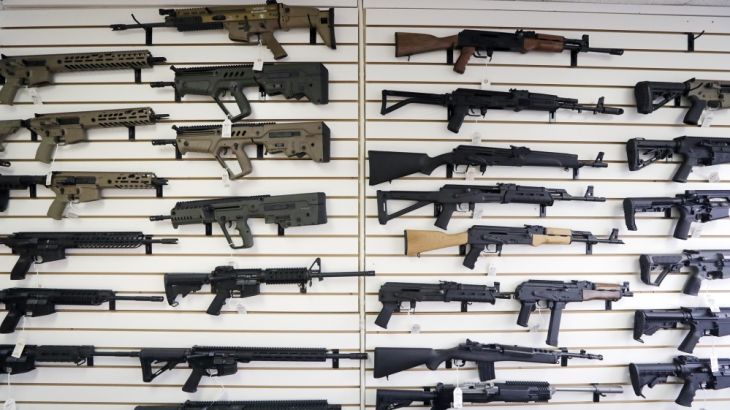
Gun economics: The weaponisation of the US
Examining the billion-dollar US gun industry and how it affects countries, markets and people around the world.
On October 27, 11 people were killed when a heavily armed gunman opened fire at a baby-naming ceremony at a synagogue in Pittsburgh. Police said he used a legally purchased assault rifle and three handguns.
In our previous investigation into the established and long-lived US gun industry, we noted how gun manufacturers themselves rarely give interviews. Dozens of companies have ended partnerships with the National Rifle Association or (NRA), the pro-gun lobby.
Keep reading
list of 4 itemsWhy are nations racing to buy weapons?
Parallel economy: How Russia is defying the West’s boycott
US House approves aid package worth billions for Ukraine, Israel
But after the Pittsburgh shooting, US President Donald Trump immediately directed attention to the lack of an armed guard at the synagogue, claiming the shooting “has little to do with” the country’s gun laws.
He told the media “This is a case where if they had an armed guard inside, they might have been able to stop him immediately. So, this would be a case for, if there was an armed guard inside the temple, they would have been able to stop him”.
The NRA has been incredibly successful in creating a public climate that's pro-gun, but far more important than that, it has effectively bought the support of the politicians who would need to regulate the industry.
The US gun industry is estimated to be worth $51bn and “the US produces somewhere between 35-40 percent of all weaponry in the world,” says Andrew Feinstein, executive director of Corruption Watch and author of The Shadow World: Inside the Global Arms Trade.
“The industry’s smaller and lighter weapons, like handguns and rifles, is a smaller component and of that its globally worth about $8bn. In the US, it’s probably worth around $4bn.”
While repeated public outcries against gun violence have taken place, the industry has been able to insolate itself against backlash, according to Feinstein.
“The NRA has been incredibly successful in creating a public climate that’s pro-gun, but far more important than that, it has effectively bought the support of the politicians who would need to regulate the industry. And unfortunately, that flow of money to those politicians which enables them to stay in power because America is often described as ‘the best democracy money can buy.’ I describe the weapons procurement business as a form of legal bribery – those politicians are effectively insulated from public opinion.”
“Now, there’s a possibility in the imminent American elections that we could for the first time in many decades, start to see a slight shift in that. We’re seeing a number of public groups like ‘Moms Demand Gun Control’, for instance, who are trying to energise voters not to vote for any candidate who isn’t critical of the gun lobby and doesn’t commit to much greater regulation to guns in the United States.”
|
|
America’s gun industry “has a massive impact in the world,” explains Feinstein.
“First, it creates this global environment of militarism. The US is involved in more conflicts than any other country on the planet. In fact, the US government employs more people to run one aircraft carrier than it has diplomats across the entire world and the United States today has 11 aircraft carriers. How that affects America’s immediate neighbours is even more insidious.”
“So, a country like Mexico that has certain law and order problems relating to the drugs trade and gun running. The vast majority of those guns in Mexico used by militias, used by criminals – both organised and informal, come from the United States of America.”
“So, while Donald Trump talks about building a wall, what he doesn’t seem to realise is there’s an enormous and very profitable flow of guns into Mexico from the US that he probably wouldn’t want to stop. So you have a flow of guns into Mexico and in return, you have a flow of drugs and other illicit activities into the US. So what this is doing is, it’s destabilising those neighbouring countries like Mexico … and it’s having a devastating impact on the US,” says Feinstein.
Also on this week’s Counting the Cost:
Brexit budget: How do you budget for Brexit when you don’t even know what it’ll look like?
The UK government did exactly that this week. UK chancellor Philip Hammond’s spending plan was set out at a time when the EU and the UK can’t reach an agreement on how to break up. Big spending decisions were deferred, meaning austerity is still in place.
|
|
Public services apart from healthcare, like schools and police will remain starved of cash despite upgrades to growth forecasts. And there could be more pain in store.
Meanwhile, “The Bank of England and the Treasury are both telling us there’s a huge amount of uncertainty, but they’re trying to provide a calming message to markets as we try and negotiate the final stages of the withdrawal agreements,” says James Knightley, chief international economist at ING.
Google walkout: Thousands of Google employees around the world have walked off the job to protest against sexual harassment. The company has faced criticism over multimillion-dollar payouts to top executives accused of sexual misconduct. Rob Reynolds reports from Los Angeles.
Bhutan happiness: Bhutan is the only country in the world to measure the success of the nation not by economic growth but by “gross national happiness”. The philosophy’s been at the centre of all government policy for the past 10 years, but as the country continues to develop, the nation’s happiness policy is under strain. Neave Barker reports from Bhutan.